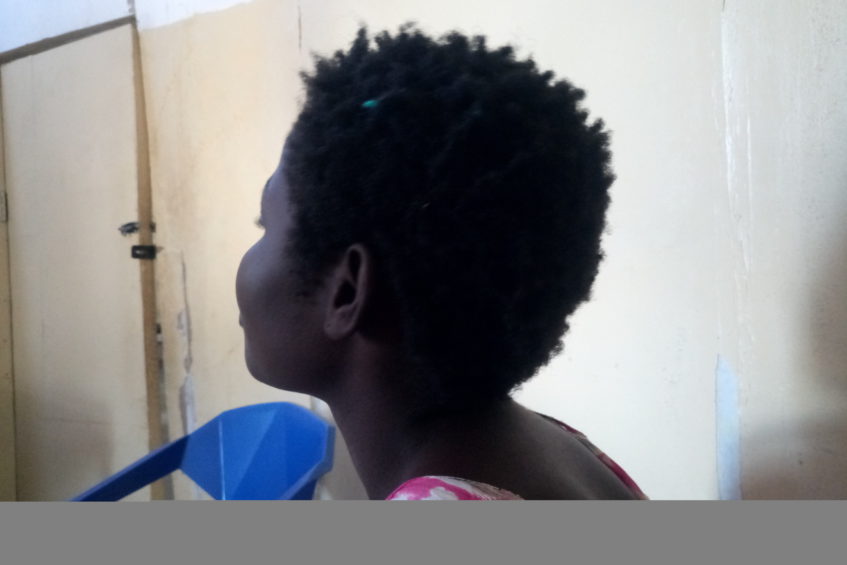
A 22 year old mother, Agnes Yabang Simon speaking to Eye Radio at Juba Military Hospital. Credit: Charles Wote/Eye Radio- 11th Sept 2021
On September 17th, South Sudan joined the rest of the world to mark the World Patient Safety Day.
The day was designated by the United Nations as World Patient Safety Day.
It was established in 2019 to enhance global understanding of patient safety, increase public engagement in the safety of health care and promote global actions to enhance patient safety and reduce patient harm.
Like many other South Sudanese women, Agnes Yabang Simon just lost her newborn baby this month after developing complications during the caesarean section at Juba military hospital.
The mother of two says she is anemic because nobody is taking care of her after she lost husband in a road ambush.
Being in her early 20s, Yabang says she was recommended for caesarean section for the second time after the doctors identified that her pelvis was small to deliver a baby vaginally.
Caesarean section or caesarean delivery is the surgical procedure by which a baby is delivered through an incision in the mother’s abdomen.
This is often performed because vaginal delivery would put the baby or mother at risk.
Experts believe that cephalopelvic disproportion or CPD often occurs when the baby has a high estimated fetal weight and the mother is petite.
Yabang was referred to Juba Military Hospital after what she called “power blackout” at Juba Teaching Hospital where she was admitted for labor.
Being a mother of two supposedly, Yabang told Eye Radio that she lost her husband in January this year during a road ambush along Juba – Yei road a month after conceived.
“I lost my husband and there is no proper care for me right from my pregnancy and right now even though I am anemic. There is no proper food. I am eating the beans. There is nobody who is bringing me food at home, my family members are very far away.”
Yabang physically looks anemic, as she had lost weight due to complications and lack of sufficient nutritional food.
Experts recommend that a mother-to-be diet should include a variety of healthy foods and beverages to provide the important nutrients a baby needs for growth and development.
A pregnant woman needs more calcium, folic acid, iron and protein than a woman who is not expecting, according to the American College of Obstetricians and Gynecologists.
The UN agencies report that South Sudan has the highest maternal death rate in the world estimated at 789 deaths per 100,000 live births.
The country has experienced recurrent humanitarian crises which have deepened and spread since December 2013.
Approximately 2.6 million people – about one in every five people in South Sudan – have been forced to flee their homes since the conflict began.
The humanitarian crisis has had devastating effects on food security, child survival, access and utilization of health services and escalation of the economic situation.
Despite losing her infant, the young mother is encouraging mothers to deliver in the hospital to avoid losing their babies or putting their lives at risk.
“When I came here I saw that the doctors were cooperative, they were so loving and they were so encouraging. Though I lost my child, they gave me courage,” Agnes said.
“The good part of it is I am ok and the doctors have assured me that they will do all possible means to make sure that I am fine. My message to the mothers is that it is very risky for mothers to deliver at home. Let them be delivered to the hospital for their safety.”
This year, the World Health Organization urges all stakeholders to “act now for safe and respectful childbirth!” with the theme “safe maternal and newborn care”.
WHO estimates that approximately 810 women die every day from preventable causes related to pregnancy and childbirth around the World.
It adds that around 6,700 newborns die every day, amounting to 47% of all under-5 deaths.
However, Dr. Marin Admin Thon, the Obstetrician and Gynecologist at Juba Military Hospital explained the importance of delivering in the health facilities.
“It is important for women to come and deliver at a health facility because one, when the mothers come to deliver, they are properly screened for anemia which is low level of blood especially the immunoglobulin may be low,” Dr. Marin said.
“The best way which it can be known is through the clinical science symptoms that the trained clinicians will be able to see. Two, the ability of the child inside the womb to be clearly monitored like the filter heartrate of the baby is being monitored every 30 minutes.”
Support Eye Radio, the first independent radio broadcaster of news, information & entertainment in South Sudan.
Make a monthly or a one off contribution.
Copyright 2024. All rights reserved. Eye Radio is a product of Eye Media Limited.